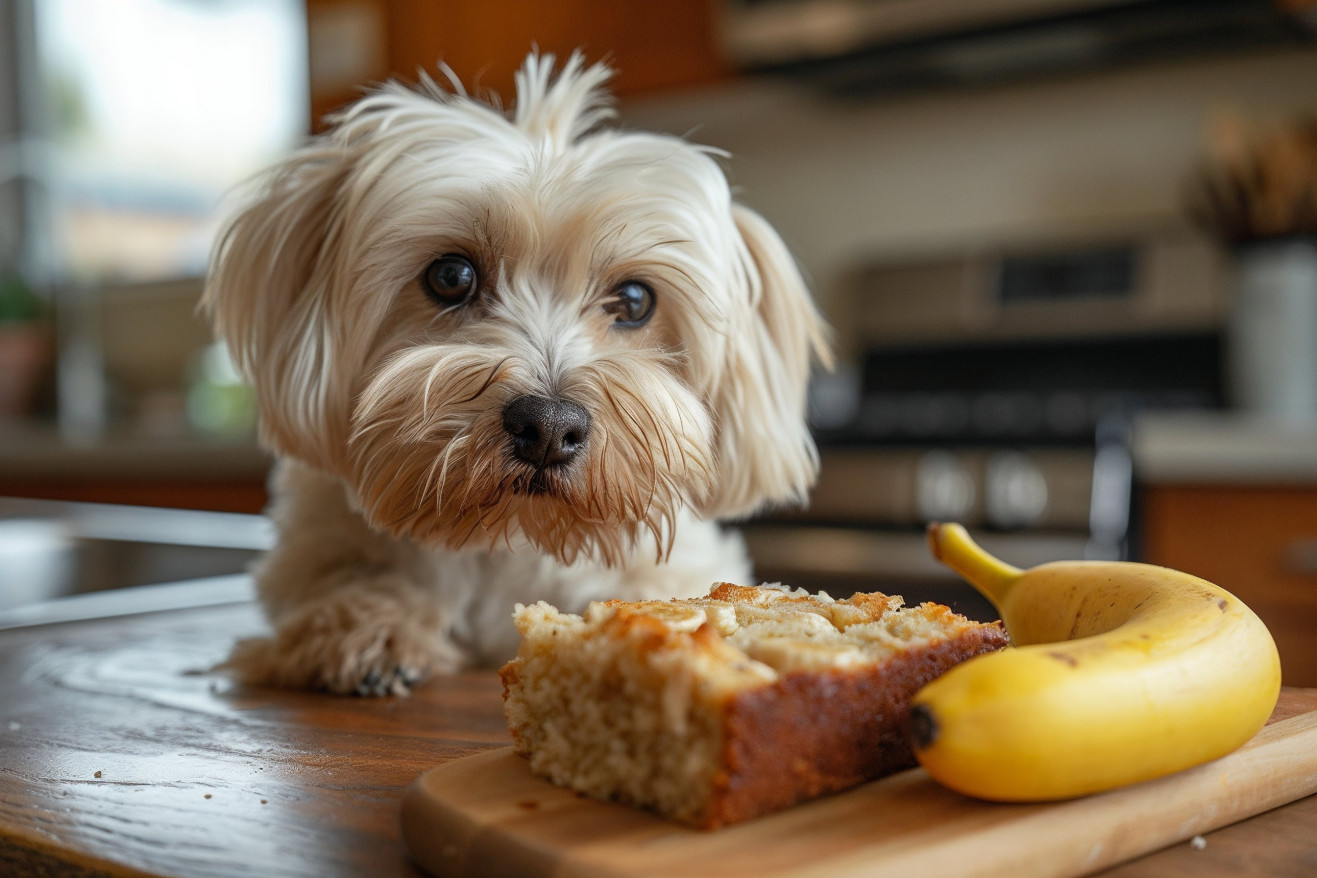Can Dogs Eat Banana Bread? Unpacking the Risks and Safe Alternatives
7 February 2024 • Updated 7 February 2024

Your dog may eye your banana bread, but can they actually have a piece? Dogs should not eat banana bread because it can contain ingredients that are toxic to dogs, like chocolate, xylitol, and nuts. Plus, the sugar in banana bread isn’t good for dogs either. Instead, give your dog a small amount of plain banana as a treat.
This article will use insights from veterinarians, principles of dog nutrition, and research on food safety to explain the risks and potential rewards of giving banana bread to dogs.
It will explore what dogs need in their diets, the ingredients in banana bread, and what dogs can eat instead that’s more in line with their nutritional needs. With this information, you can make better choices about what you give your dog as a treat and what you feed them in general.
Can dogs eat banana bread?
Meeting Your Dog’s Nutritional Needs
A complete and balanced diet for dogs includes proteins, fats, carbohydrates, minerals, and vitamins, all of which are important for different aspects of a dog’s health. For example, VCA Animal Hospitals notes that even though dogs are omnivores, they need essential amino acids from proteins and essential fatty acids from fats. Dogs can also get more energy from complex carbohydrates, such as grains, if they are cooked.
Dogs’ nutritional needs can also depend on factors like their size, breed, and life stage, and PetMD notes that life-stage nutrition is especially important. For example, puppies need a diet that supports their rapid growth, while senior dogs need a diet that takes their slower metabolism into account.
It’s also important to consider dietary sensitivities and avoid ingredients that can cause harm or allergic reactions in dogs. In addition, treats should be fed in moderation and as part of a balanced diet, and owners should avoid giving their dogs more treats than the daily recommended amount to avoid throwing off their diet.
When it comes to banana bread, it’s unclear whether or not it meets dogs’ nutritional needs. While some of the ingredients in banana bread, such as bananas, may be safe for dogs, the overall nutritional profile of banana bread, which is often high in sugar and may contain toxic ingredients, makes it an unhealthy choice for dogs.
This highlights the importance of owners being mindful of their dogs’ nutritional needs and choosing treats that will benefit their health.
What’s in Banana Bread That’s Bad for Dogs?
Banana bread is a tasty snack for people, but it contains several ingredients that are toxic to dogs. Chocolate, which is often an ingredient in banana bread, contains methylxanthines that the ASPCA says can cause a range of problems in dogs, from vomiting and diarrhea to death.
Xylitol, a sugar substitute that’s sometimes used in banana bread, is especially dangerous for dogs because it causes insulin to be released in their bodies, which can lead to hypoglycemia and possibly liver failure.
In addition, a study by PetMD notes that sugar and high-calorie foods can cause problems for dogs, including obesity, metabolic changes, and diabetes. Dogs can also be intolerant to gluten, and dogs with grain allergies can have negative reactions to wheat flour, which is a common ingredient in banana bread. Finally, additives and preservatives, which are often used in store-bought banana bread, can be problematic for dogs, although the exact risks aren’t always clear.
Given the potential for these ingredients to cause digestive upset and more serious health problems, it’s clear that banana bread isn’t safe for dogs. It’s important to stick to dog-safe treats to ensure that your pet stays healthy.
The Nutritional Value of Banana Bread for Dogs
While bananas are full of vitamins and minerals that can be good for dogs, the nutritional value of banana bread is much lower. That’s because banana bread isn’t just made with bananas—it also contains ingredients like sugar and flour that don’t offer any nutritional value to dogs.
The American Kennel Club explains that while whole grains can be a good source of fiber, the high number of calories in banana bread outweighs the benefits of fiber and can lead to weight gain.
If you make your own banana bread, you can control the ingredients and make it healthier for your dog than store-bought banana bread, which may contain preservatives and other unhealthy additives. However, even homemade banana bread contains sugar and other ingredients that don’t offer nutritional value to dogs.
As a result, it’s best to avoid the temptation to feed your dog a diet that’s too similar to your own and instead focus on feeding them foods that meet their specific nutritional needs. By prioritizing dog-appropriate foods over human treats, you can help ensure that your dog stays healthy and avoids the dangers of banana bread and similar items.
Give Them What They Deserve: Dog-Safe Banana Bread Alternatives
When it comes to giving your pets treats, you want to make sure that you’re giving them the best options for their safety and well-being. As MasterClass notes, instead of giving your dog a piece of banana bread, you can give them a plain, peeled banana.
Bananas are safe for dogs in small amounts and they have the same natural sweetness that you’d want to give your dog without the potential dangers of banana bread. For a fun twist, you can freeze banana slices for a cool treat, or mix them with unsweetened peanut butter for a delicious dog-friendly snack.
Making your own dog treats at home can be a fun way to make sure that your pet is getting the best options for their health. For example, you can bake small pieces of sweet potato or carrot, both of which are healthy and safe for dogs. That said, make sure to give these treats in moderation to avoid issues like obesity and other health problems.
Make sure to introduce new treats slowly so that you don’t upset your dog’s stomach. Start with small amounts and watch for any negative side effects.
That said, it’s important to remember that dog treats that are made specifically for dogs and don’t contain any harmful additives and are made to meet their nutritional needs are always better than human food. This will ensure that your dog can enjoy their treats in a way that’s both happy and healthy.
Making Informed Choices: Final Thoughts on Dog Diets and Banana Bread
In conclusion, the risks of feeding banana bread to our dogs far outweigh the benefits. The potential for exposure to toxic ingredients like chocolate and xylitol, as well as the high sugar and chemical content, make banana bread a risky choice for our pets. This highlights the importance of understanding the nutritional needs of dogs and the responsibility of pet owners to ensure that the treats they feed their dogs meet those needs.
We encourage pet owners to feed their dogs treats that are specifically formulated for dogs and that will benefit their health. As PetMD points out, this includes healthy options like green beans, carrots, and bananas, but it’s also important to remember that even these treats should be fed in moderation. To prevent obesity and other health issues, treats should make up no more than 10% of a dog’s daily caloric intake.
In the end, it’s up to you to take care of your pet. By paying attention to the nutritional content of the food you feed them and avoiding toxic ingredients, you show your love and concern for your pet.
It’s always a good idea to seek out personalized advice that takes your dog’s individual needs into account, whether that means doing more research or talking to a vet. By making informed choices about the treats you feed your dog, you can help ensure that they live a happy and healthy life.


